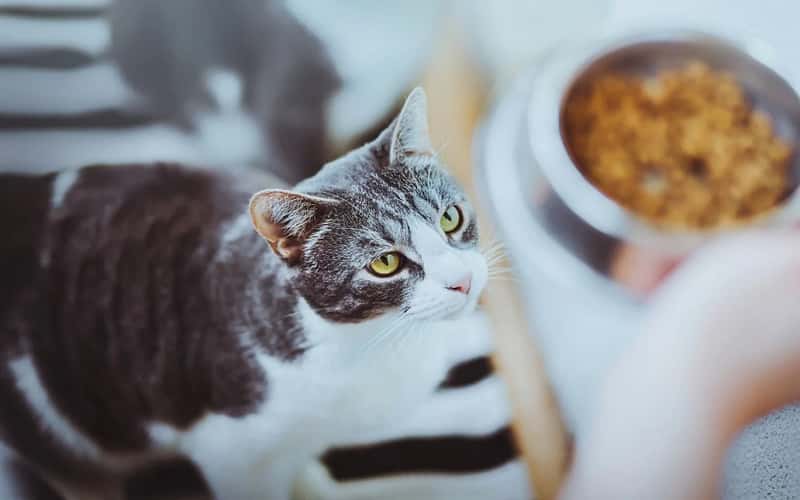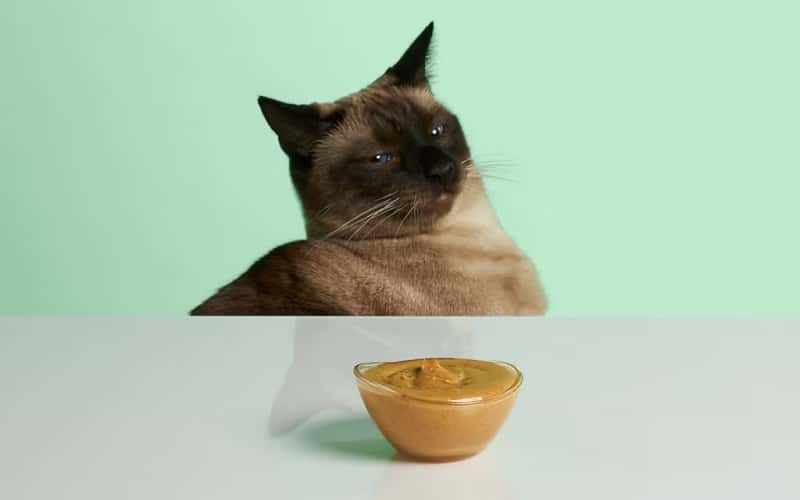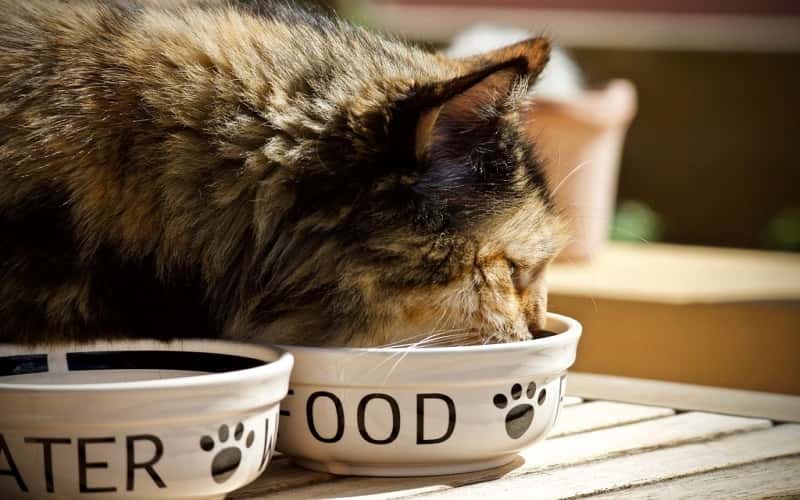Peanut Butter Nutritional Information
Peanut butter is a nutrient-rich food that provides significant amounts of protein, healthy fats, fiber, and various essential vitamins and minerals. A 2 tablespoon serving of peanut butter typically contains around 190-200 calories, 7-8 grams of protein, 16-18 grams of fat (mostly unsaturated), 6-7 grams of carbohydrates, and 2-3 grams of fiber.
Peanut butter is also a good source of vitamin E, magnesium, phosphorus, and potassium. However, it should be consumed in moderation as it is high in calories and fat. Additionally, some brands of peanut butter may contain added sugars or salt, so it’s important to read the label carefully before purchasing.
Is Peanut Butter Safe for Cats to Eat? Can Cats Eat Peanut Butter?
No, peanut butter is not recommended as a regular part of a cat’s diet. While some cats may enjoy the taste of peanut butter, it does not provide any nutritional benefit to them and can even be harmful. Peanut butter contains high levels of fat and calories that can lead to obesity in cats, as well as potential complications such as pancreatitis.
Furthermore, some brands of peanut butter contain xylitol, an artificial sweetener that can be toxic to cats. Therefore, it is best to avoid feeding peanut butter to cats and stick to a balanced diet that meets their nutritional needs.
Are there any health benefits for cats eating peanut butter?
While peanut butter is not toxic to cats, it should not be a regular part of their diet as it can cause digestive issues and obesity. Some cats may also be allergic to peanuts. Therefore, there are no significant health benefits for cats eating peanut butter and it is not recommended as a dietary addition. It’s best to stick to their regular cat food and treats that are specifically formulated for their nutritional needs.

Cats eat peanut butter
Can Cats be Allergic to Peanut Butter?
Yes, cats can be allergic to peanut butter. Peanut butter contains proteins that can trigger an allergic reaction in some cats, just like in humans. Symptoms of a peanut butter allergy in cats may include itching, skin rash, vomiting, diarrhea, and difficulty breathing.
It is important to note that cats are obligate carnivores, meaning their diet should mainly consist of meat, so peanut butter should not be a regular part of their diet. If you suspect your cat is allergic to peanut butter or any other food, it’s best to consult with a veterinarian for proper diagnosis and treatment.
What are the signs and symptoms of peanut butter toxicity in cats?
The signs and symptoms of peanut butter toxicity in cats may include vomiting, diarrhea, abdominal pain, loss of appetite, lethargy, difficulty breathing, coughing, and tremors. These symptoms are caused by the presence of xylitol, a sugar substitute commonly found in peanut butter, which can be toxic to cats. It is important to seek veterinary care immediately if you suspect your cat has ingested anything containing xylitol.
How much peanut butter can cats consume without causing harm?
Cats should not be fed peanut butter regularly as it is not a part of their natural diet and can cause digestive issues. However, small amounts of peanut butter as an occasional treat are generally safe for cats. It is important to ensure that the peanut butter does not contain xylitol, which is toxic to cats.
A cat’s weight and overall health should also be taken into consideration when determining how much peanut butter they can consume without causing harm. As a general guideline, a small amount, such as a lick or two, is sufficient for a cat’s treat.
What Happens if a Cat Eats too much Peanut Butter?
If a cat eats too much peanut butter, it may experience digestive issues such as vomiting, diarrhea, or constipation. Peanut butter is high in fat and can cause pancreatitis in cats, which is a serious condition that requires immediate medical attention.
Furthermore, peanut butter often contains additives like xylitol, which is toxic to cats and can lead to a range of symptoms including seizures and liver failure. Therefore, it’s important to avoid feeding cats large amounts of peanut butter or any other human foods without consulting a veterinarian first.
What should I do if my cat accidentally eats too much peanut butter?
If your cat accidentally eats too much peanut butter, you should monitor their behavior for any signs of discomfort or illness such as vomiting, diarrhea, or difficulty breathing. If you notice any of these symptoms, you should seek veterinary care immediately. Additionally, you should make sure to keep all human food, including peanut butter, out of your cat’s reach in the future to prevent similar incidents from occurring.

Cats eat peanut butter
Should I consult a veterinarian before giving my cat peanut butter?
Yes, you should consult a veterinarian before giving your cat peanut butter. While peanut butter itself is not toxic to cats, it can be difficult for them to digest and may cause gastrointestinal issues such as vomiting or diarrhea. Additionally, some peanut butters contain xylitol, an artificial sweetener that is toxic to cats even in small amounts. A veterinarian can provide guidance on whether or not peanut butter is appropriate for your specific cat, and if so, how much and how often it can safely be given.
Recipes for Homemade Cat Treats with Peanut Butter.
Sure, I can provide you with a brief explanation on Recipes for Homemade Cat Treats with Peanut Butter.
Peanut butter is often used in homemade cat treat recipes due to its nutty flavor and high protein content. Here are some simple recipe ideas for making homemade cat treats with peanut butter:
Peanut Butter and Oatmeal Cat Cookies: Mix together oatmeal, peanut butter, and water until it forms a dough consistency. Roll the dough into small balls and bake them at 350°F for about 15 minutes.
Peanut Butter and Tuna Cat Treats: Mix canned tuna, peanut butter, and flour until it forms a dough. Roll out the dough and cut it into small shapes using cookie cutters. Bake the treats at 350°F for around 10-15 minutes.
Peanut Butter and Banana Cat Bites: Blend together a ripe banana and peanut butter until it forms a smooth mixture. Scoop the mixture into small bite-sized balls and freeze them for a couple of hours before serving.
Remember to always check with your vet before introducing any new foods or treats into your cat’s diet, especially if they have any dietary restrictions or health issues.
Conclusion: Is It Good or Bad to Peanut Butter to Cats?
Yes, cats can eat peanut butter in moderation and as an occasional treat. Peanut butter is not toxic to cats, and it can be a good source of protein and healthy fats. However, peanut butter also has a high fat content and may contain added sugars or salt, which can be harmful to cats if consumed excessively.
Additionally, some cats may have allergies or sensitivities to peanuts, so introducing peanut butter to your cat’s diet should be done slowly and in small amounts while monitoring for any adverse reactions.

Cats eat peanut butter
What are some alternative treats that cats can enjoy besides peanut butter?
Some alternative treats that cats can enjoy besides peanut butter are: canned tuna, cooked chicken or turkey, freeze-dried meat or fish, small amounts of cheese or yogurt (if they tolerate lactose), and cat-friendly fruits such as bananas or cantaloupe. However, it’s important to keep in mind that treats should only make up a small portion of a cat’s diet, and should be given in moderation to prevent health issues such as obesity.
Do all cats enjoy the taste of peanut butter?
No, not all cats enjoy the taste of peanut butter. Some cats may like the flavor, while others may show no interest or even dislike it. It ultimately depends on the individual cat’s taste preferences.
Additionally, it’s important to note that some cats may have allergies or intolerances to certain ingredients in peanut butter, such as peanuts or sugar, which can cause digestive issues or other health problems. Therefore, it is generally not recommended to feed cats peanut butter as a regular treat without consulting with a veterinarian first.
Are there any specific types of peanut butter that are safer for cats?
There are no specific types of peanut butter that are safer for cats. While peanut butter is not toxic to cats, it is also not a necessary part of their diet and should be given in moderation as an occasional treat. Some peanut butters may contain additives like xylitol, which can be toxic to cats, so it’s important to read labels carefully before giving any human food to your cat.
Additionally, some cats may have allergies or intolerances to peanuts, so it’s best to consult with a veterinarian before introducing peanut butter or any other new food to your cat’s diet.
What Fruits Cats Can Eat?
Cats can eat certain fruits such as small amounts of sliced apples, bananas, and berries like blueberries, strawberries, and raspberries. However, cats are obligate carnivores and require meat as the main component of their diet. It is important to note that some fruits, such as grapes and raisins, can be toxic to cats and should be avoided. Additionally, fruits should only make up a small portion of a cat’s diet and should not replace their regular food.
Can Kittens Eat Peanut Butter?
Peanut butter is safe for cats to eat in small amounts, as long as it does not contain xylitol. Xylitol is a sugar substitute that is toxic to cats and can lead to liver failure.
Summary:
Peanut butter is safe for cats to eat in small amounts if it does not contain xylitol.
Source: https://petscaretip.com/

